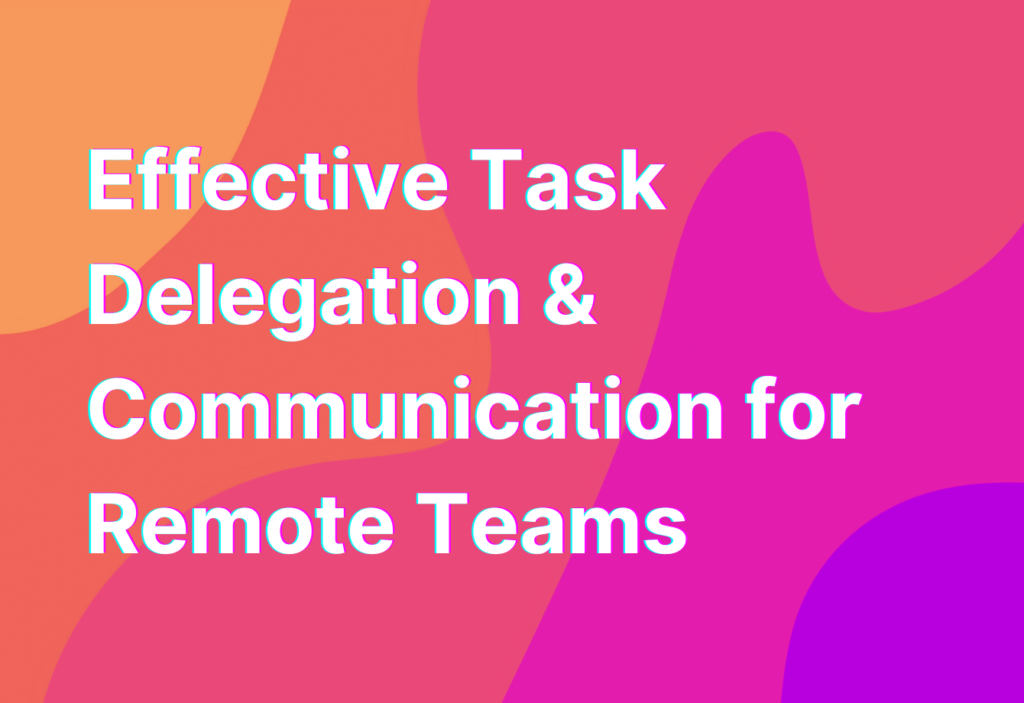Effective Task Delegation & Communication for Remote Teams
Hey there, remote work enthusiasts! It’s Ashley here, your friendly remote work advocate with 10 years of experience in the tech industry. Today, I want to talk about a crucial aspect of remote team collaboration: task delegation. As remote teams become more common, it’s essential to have effective communication and delegation strategies in place to ensure everyone is on the same page and tasks are completed efficiently. So, let’s dive in and explore some tips and tricks for effective task delegation in remote teams!
1. Clearly Define Roles and Responsibilities
When working remotely, it’s crucial to have clearly defined roles and responsibilities for each team member. This helps avoid confusion and ensures that everyone knows what they are accountable for. Whether you’re using project management tools like Trello or Asana, or simply creating a shared document, make sure to outline each team member’s tasks and responsibilities.
For example, if you’re working on a marketing campaign, you might assign one team member to handle social media management, another to create content, and someone else to analyze campaign data. By clearly defining these roles, you can avoid duplication of efforts and ensure that everyone knows what they need to focus on.
2. Communicate Expectations and Deadlines
Effective task delegation goes hand in hand with clear communication. As a remote team, you don’t have the luxury of face-to-face interactions, so it’s crucial to communicate expectations and deadlines clearly. When assigning tasks, be specific about what you expect from each team member and set realistic deadlines.
One way to ensure effective communication is by using project management tools that allow you to set deadlines and send notifications. Tools like Trello or Asana can help you keep track of tasks, deadlines, and progress. Additionally, regular check-ins and team meetings can help clarify any questions or concerns and ensure that everyone is on track.
3. Foster Collaboration and Feedback
Remote work doesn’t mean working in isolation. Collaboration and feedback are essential for remote teams to thrive. Encourage your team members to collaborate and share ideas, even if they are working on different tasks. This can be done through virtual brainstorming sessions, team chats, or video conferences.
Additionally, providing regular feedback is crucial for remote teams to improve and grow. Take the time to recognize your team members’ achievements and provide constructive feedback when necessary. This helps create a positive and supportive work environment, even when working remotely.
4. Utilize Technology and Tools
Technology plays a vital role in effective task delegation for remote teams. There are numerous tools available that can help streamline communication and collaboration. Here are a few popular ones:
- Trello: A project management tool that allows you to create boards, lists, and cards to organize tasks and track progress.
- Asana: Another project management tool that helps teams organize, track, and manage their work.
- Slack: A messaging platform that allows teams to communicate and collaborate in real-time.
- Zoom: A video conferencing tool that enables virtual meetings and screen sharing.
- Remote Teamer’s guide on effective UI communication for remote teams: A comprehensive resource on how to improve user interface (UI) communication in remote teams.
By utilizing these tools, you can enhance communication, track progress, and ensure that tasks are completed efficiently.
5. Trust and Empower Your Team
Trust is the foundation of any successful remote team. When delegating tasks, it’s essential to trust your team members to deliver quality work. Micromanaging can be counterproductive and hinder productivity. Instead, empower your team by giving them autonomy and allowing them to take ownership of their tasks.
Remember, remote work offers flexibility and freedom, so embrace it! Trust that your team members will complete their tasks effectively and provide support when needed.
Wrapping Up
Effective task delegation is crucial for remote teams to thrive. By clearly defining roles, communicating expectations, fostering collaboration, utilizing technology, and trusting your team, you can ensure that tasks are delegated effectively and completed efficiently.
Remember, remote work is all about finding the right balance between independence and collaboration. So, embrace the flexibility, leverage the available tools, and empower your team to achieve great things!


